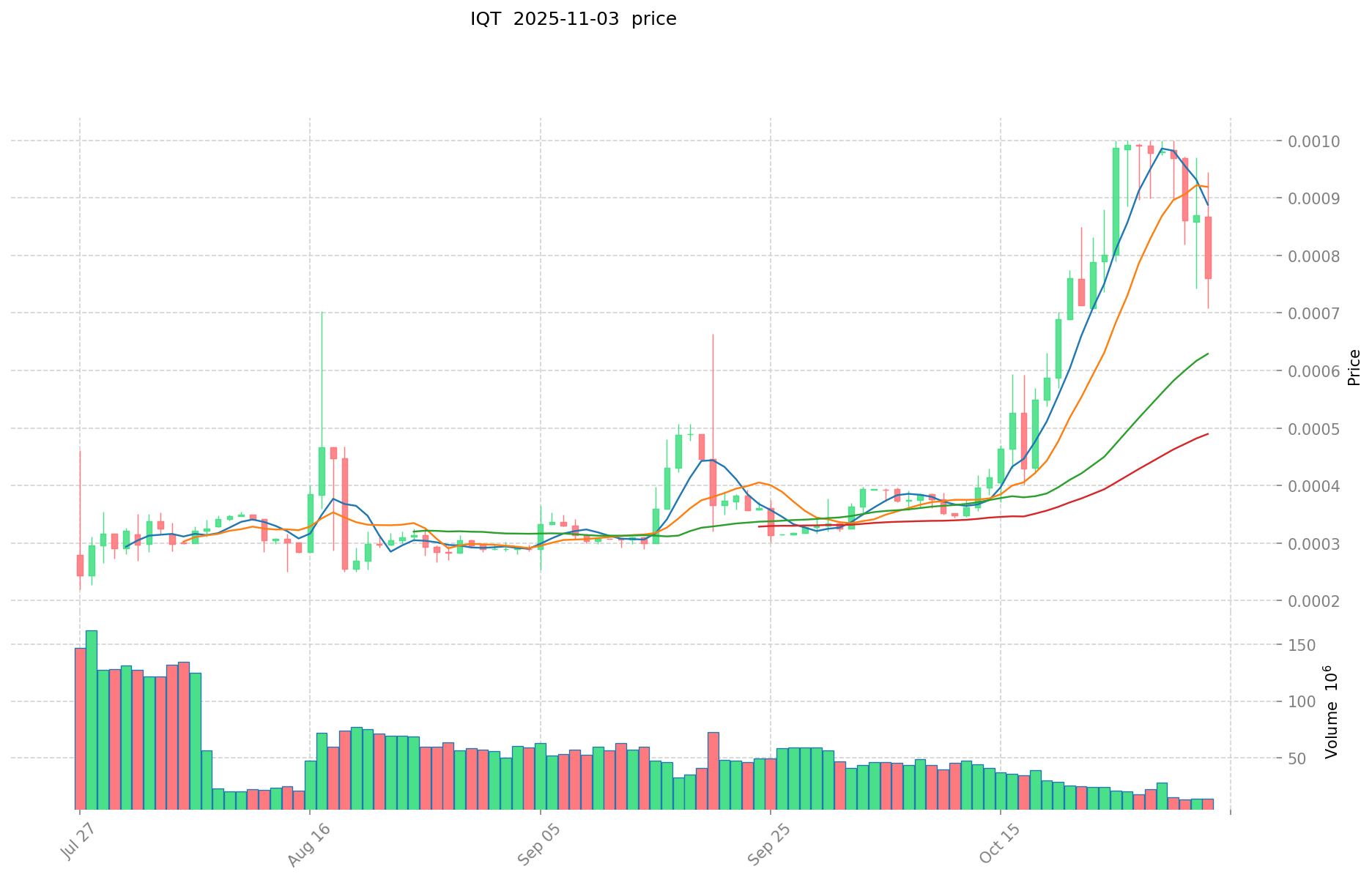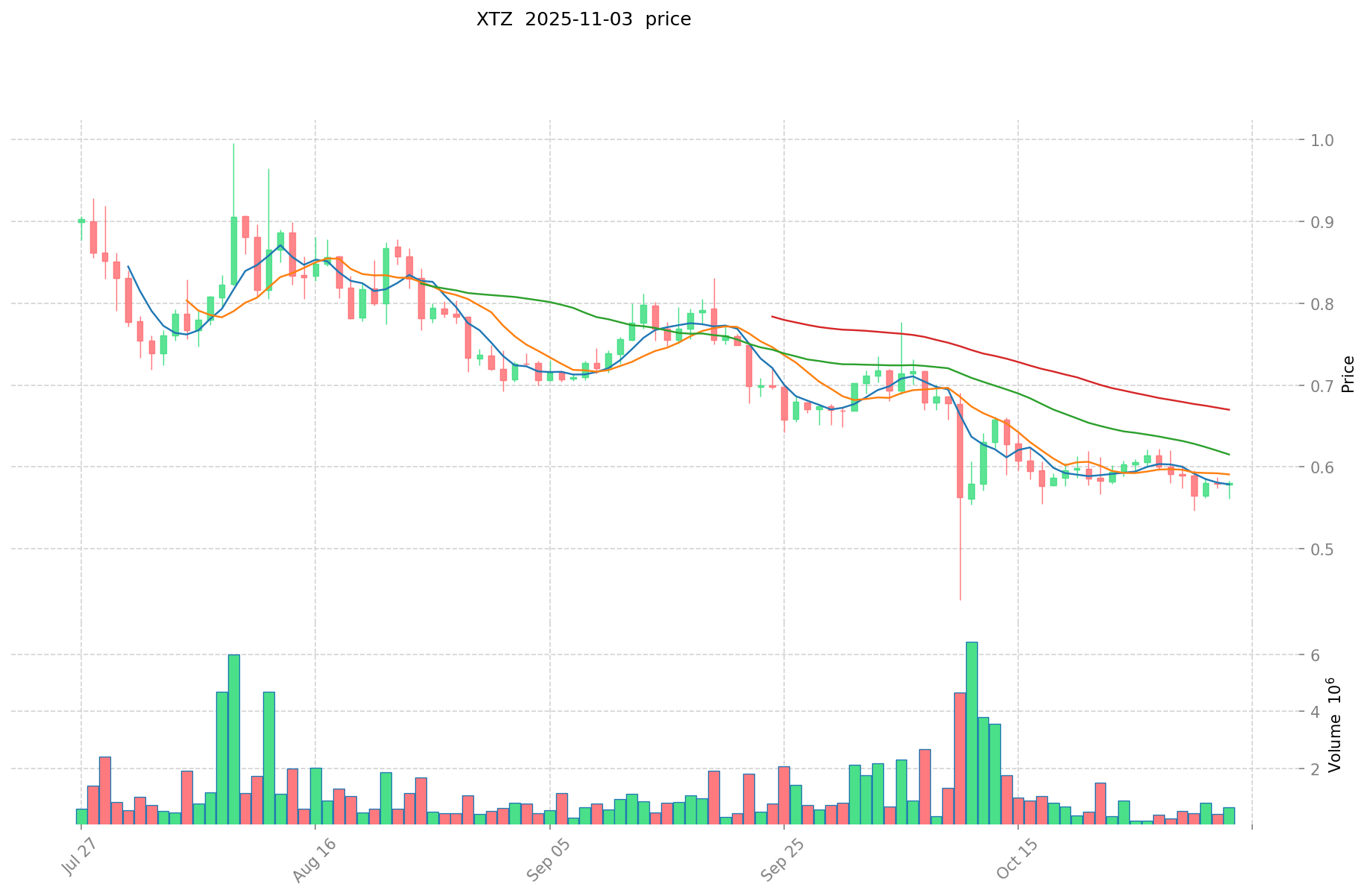IQT vs XTZ: Analyzing the Performance and Potential of Two Emerging Cryptocurrencies
Introduction: Investment Comparison of IQT vs XTZ
In the cryptocurrency market, the comparison between IQ Protocol (IQT) vs Tezos (XTZ) has been an unavoidable topic for investors. The two not only show significant differences in market cap ranking, application scenarios, and price performance, but also represent different positions in crypto assets.
IQ Protocol (IQT): Since its launch, it has gained market recognition for its NFT rental technology.
Tezos (XTZ): Since its inception in 2017, it has been hailed as a self-evolving blockchain platform, and is one of the cryptocurrencies with significant global trading volume and market capitalization.
This article will comprehensively analyze the investment value comparison between IQT and XTZ, focusing on historical price trends, supply mechanisms, institutional adoption, technical ecosystems, and future predictions, attempting to answer the question that investors care about most:
"Which is the better buy right now?"
I. Price History Comparison and Current Market Status
IQT and XTZ Historical Price Trends
- 2021: XTZ reached its all-time high of $9.12 on October 4, 2021.
- 2018: XTZ hit its all-time low of $0.350476 on December 7, 2018.
- Comparative analysis: During market cycles, XTZ has shown significant volatility, ranging from its all-time high to its all-time low. IQT's price history is more limited, with less extreme fluctuations.
Current Market Situation (2025-11-03)
- IQT current price: $0.0007498
- XTZ current price: $0.5694
- 24-hour trading volume: IQT $10,722.69 vs XTZ $375,443.36
- Market Sentiment Index (Fear & Greed Index): 42 (Fear)
Click to view real-time prices:
- Check IQT current price Market Price
- Check XTZ current price Market Price


II. Core Factors Affecting IQT vs XTZ Investment Value
Supply Mechanism Comparison (Tokenomics)
- IQT: Blockchain immutability ensures transaction transparency and security, giving it significant potential in the financial sector
- XTZ: High transparency in transaction history enhances market trust and credibility
- 📌 Historical pattern: Supply mechanisms drive price cycle changes influenced by global cryptocurrency market trends
Institutional Adoption and Market Applications
- Institutional holdings: Market demand affects which token receives institutional preference
- Enterprise adoption: Both tokens' value depends on their stability and utility in blockchain networks
- Regulatory attitudes: Investment value is influenced by varying regulatory approaches across different countries
Technical Development and Ecosystem Building
- Technical innovation: Both tokens' investment value is closely tied to ongoing technical innovations
- Community support: Strong community backing enhances long-term investment potential
- Ecosystem comparison: The development of surrounding ecosystems impacts overall token value and utility
Macroeconomic Factors and Market Cycles
- Performance in inflationary environments: Market dynamics determine inflation resistance properties
- Macroeconomic monetary policies: Global crypto market trends affect price volatility of both tokens
- Geopolitical factors: Investors should monitor market dynamics and technological developments as they impact cross-border transaction demand
III. 2025-2030 Price Prediction: IQT vs XTZ
Short-term Prediction (2025)
- IQT: Conservative $0.000614836 - $0.0007498 | Optimistic $0.0007498 - $0.001004732
- XTZ: Conservative $0.53103 - $0.571 | Optimistic $0.571 - $0.67378
Mid-term Prediction (2027)
- IQT may enter a growth phase, with prices expected in the range of $0.000597856779 - $0.0014740261965
- XTZ may enter a growth phase, with prices expected in the range of $0.625066277 - $0.911241199
- Key drivers: Institutional fund inflows, ETFs, ecosystem development
Long-term Prediction (2030)
- IQT: Base scenario $0.001474239440674 - $0.001769087328809 | Optimistic scenario $0.001769087328809+
- XTZ: Base scenario $0.706905719844699 - $1.055083163947312 | Optimistic scenario $1.055083163947312 - $1.456014766247291
Disclaimer: This analysis is based on historical data and market projections. Cryptocurrency markets are highly volatile and unpredictable. This information should not be considered as financial advice. Always conduct your own research before making any investment decisions.
IQT:
| 年份 | 预测最高价 | 预测平均价格 | 预测最低价 | 涨跌幅 |
|---|---|---|---|---|
| 2025 | 0.001004732 | 0.0007498 | 0.000614836 | 0 |
| 2026 | 0.0011843091 | 0.000877266 | 0.00060531354 | 17 |
| 2027 | 0.0014740261965 | 0.00103078755 | 0.000597856779 | 37 |
| 2028 | 0.001440267904237 | 0.00125240687325 | 0.000989401429867 | 67 |
| 2029 | 0.001602141492605 | 0.001346337388743 | 0.000686632068259 | 79 |
| 2030 | 0.001769087328809 | 0.001474239440674 | 0.0013120731022 | 96 |
XTZ:
| 年份 | 预测最高价 | 预测平均价格 | 预测最低价 | 涨跌幅 |
|---|---|---|---|---|
| 2025 | 0.67378 | 0.571 | 0.53103 | 0 |
| 2026 | 0.8837938 | 0.62239 | 0.5850466 | 9 |
| 2027 | 0.911241199 | 0.7530919 | 0.625066277 | 32 |
| 2028 | 1.206641496775 | 0.8321665495 | 0.574194919155 | 46 |
| 2029 | 1.090762304757125 | 1.0194040231375 | 0.978627862212 | 79 |
| 2030 | 1.456014766247291 | 1.055083163947312 | 0.706905719844699 | 85 |
IV. Investment Strategy Comparison: IQT vs XTZ
Long-term vs Short-term Investment Strategies
- IQT: Suitable for investors focused on NFT and rental technology potential
- XTZ: Suitable for investors seeking established platforms with self-upgrading capabilities
Risk Management and Asset Allocation
- Conservative investors: IQT: 20% vs XTZ: 80%
- Aggressive investors: IQT: 40% vs XTZ: 60%
- Hedging tools: Stablecoin allocation, options, cross-currency portfolios
V. Potential Risk Comparison
Market Risks
- IQT: Higher volatility due to smaller market cap and lower liquidity
- XTZ: Susceptible to broader cryptocurrency market trends and competition from other smart contract platforms
Technical Risks
- IQT: Scalability, network stability
- XTZ: Centralization concerns, potential security vulnerabilities
Regulatory Risks
- Global regulatory policies may have differing impacts on both tokens, with XTZ potentially facing more scrutiny due to its larger market presence
VI. Conclusion: Which Is the Better Buy?
📌 Investment Value Summary:
- IQT advantages: Innovative NFT rental technology, potential for rapid growth
- XTZ advantages: Established platform, self-upgrading capability, larger ecosystem
✅ Investment Advice:
- Novice investors: Consider a smaller allocation to XTZ for exposure to established cryptocurrencies
- Experienced investors: Balanced portfolio with both IQT and XTZ, adjusting based on risk tolerance
- Institutional investors: Larger allocation to XTZ due to its market cap and liquidity, with potential small position in IQT for diversification
⚠️ Risk Warning: The cryptocurrency market is highly volatile. This article does not constitute investment advice. None
FAQ
Q1: What are the key differences between IQT and XTZ? A: IQT focuses on NFT rental technology, while XTZ is an established self-evolving blockchain platform. XTZ has a larger market cap, higher trading volume, and a longer price history compared to IQT.
Q2: Which token has shown better historical price performance? A: XTZ has demonstrated more significant price movements, reaching an all-time high of $9.12 in October 2021 and an all-time low of $0.350476 in December 2018. IQT has a more limited price history with less extreme fluctuations.
Q3: How do the supply mechanisms of IQT and XTZ compare? A: IQT leverages blockchain immutability for transaction transparency and security, while XTZ emphasizes high transparency in transaction history. Both mechanisms are influenced by global cryptocurrency market trends.
Q4: What are the long-term price predictions for IQT and XTZ by 2030? A: For IQT, the base scenario predicts a range of $0.001474239440674 - $0.001769087328809, with an optimistic scenario above $0.001769087328809. For XTZ, the base scenario predicts $0.706905719844699 - $1.055083163947312, with an optimistic scenario of $1.055083163947312 - $1.456014766247291.
Q5: How should investors allocate their assets between IQT and XTZ? A: Conservative investors might consider 20% IQT and 80% XTZ, while aggressive investors could opt for 40% IQT and 60% XTZ. The allocation should be based on individual risk tolerance and investment goals.
Q6: What are the main risks associated with investing in IQT and XTZ? A: IQT faces higher volatility due to its smaller market cap and lower liquidity. XTZ is more susceptible to broader cryptocurrency market trends and competition from other smart contract platforms. Both tokens are subject to technical and regulatory risks.
Q7: Which token is recommended for different types of investors? A: Novice investors might consider a smaller allocation to XTZ for exposure to established cryptocurrencies. Experienced investors could maintain a balanced portfolio with both IQT and XTZ. Institutional investors may prefer a larger allocation to XTZ due to its market cap and liquidity, with a potential small position in IQT for diversification.
Share
Content